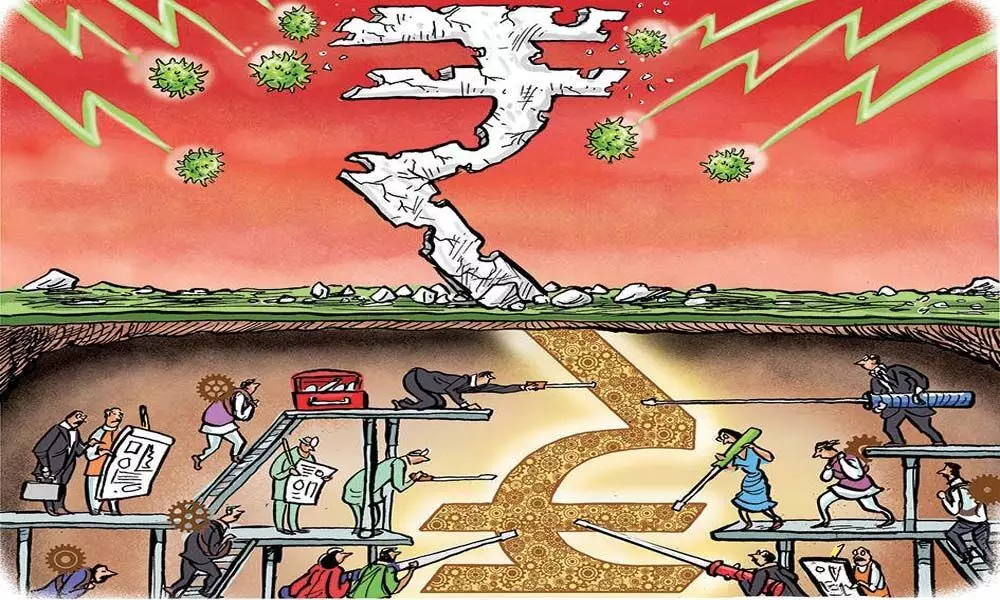Which way India's economy heading?
Stock markets make us jubilant, while GDP numbers not so exciting
image for illustrative purpose

July is the important month for India when it comes to its economy and economics. In the same month 30 years ago, India embarked on economic reforms and liberalization which changed country's fortunes for the better and forever. Under the visionary leadership of late PV Narasimha Rao, the son of Telugu soil, who took reins of the country as its Prime Minister at around that time, the then Finance Minister Manmohan Singh presented a historic Union Budget on July 24, 1991, laying a solid foundation for economic reforms that India sought to bring in.
Though the reforms were necessitated by the Balance of Payment crisis India was staring at as its forex reserves were at the lowest ebb and the country was on the verge of defaulting on international payments, the economic liberalisation, which was aimed at abolishing the Licence Raj, changed the contours of the Indian economy and put it on a higher growth trajectory. The GDP numbers tell the full story. The Indian GDP jumped by a staggering 11 times from meagre $266 billion in 1991 to nearly $3 trillion now.
However, a few weeks prior to the presentation of the game-changing Union Budget of 1991, the Centre went for devaluation of the Indian rupee against the US dollar twice to rev up its exports. It's still debatable whether this currency devaluation is a good move or not, but other economic reforms ushered in by our country at that time paid rich dividends in the last three decades.
Of course, successive elected governments at the Centre continued the reforms. And the result is there for all to see. India is now a leading player in information technology, pharmaceuticals, and several other key sectors.
However, the global economic crisis triggered by the Chinese-born novel coronavirus in 2020 took a heavy toll on the Indian economy as well. As consequence, the Indian economy contracted by a whopping 23.9 per cent during April-June 2020 quarter, the first such contraction in over 40 years. Though the economy picked up in the subsequent quarters, the country witnessed a 7.3 per cent contraction in GDP in the last financial year.
But how the economy is faring now? Signals from the ground present a contrasting picture. Owing to the prolonged crisis induced by the Covid-19 pandemic, several sectors including MSMEs are in deep trouble now and millions of people lost their jobs. Further, the economy is not yet out of woods as Covid-19 fears still lurk. While we see such a grim picture on one side, stock markets are on steroids on the other side. Benchmark indices like BSE Sensex and NSE Nifty more than doubled since their March 2020 lows. The bull-run is not showing any signs of slowing down. Sensex and its active sibling NSE Nifty are notching up one lifetime high after another even though RBI has warned that the stock markets are in a bubble zone now. The bull-run is racing ahead at such a maddening pace that even the initial public offering (IPO) by Zomato, an online restaurant aggregator and food delivery startup, got oversubscribed many times even after the startup made it clear that it incurred a loss of Rs816 crore in FY21. The losses will obviously continue in foreseeable future. But that didn't deter investors from pouring billions of rupees into the IPO.
But how can we explain these contrasting streaks of sluggish economy and bullish stock markets? During my five-year stay in the Middle East a decade ago, I learned one important fact about Pakistan, our archrival and belligerent neighbour. While many Pakistanis are rich, the Pakistan government and Pakistan as a nation is extremely poor and needs dole-outs from the US-led West and bailouts from the global funding agencies like the International Monetary Fund and the World Bank. A country where one can easily get an AK-56 home-delivered, can't paint a better picture.
Though India is far, far better than Pakistan on the economic front and is likely to emerge as a global economic superpower soon if our rulers and leaders plan well and execute the plans efficiently and effectively, recent economic signals from the country indicate that more and more Indians are getting richer by the day.
But the Indian government is struggling to mop-up enough funds to implement its welfare schemes. The Modi government shocked the country and put the economy in temporary peril by announcing demonetisation in November 2016. The surprise move was to weed out the black or unaccounted money. But going by the trends post the ill-advised demonetisation exercise, the country seems to have generated more black money than it ever did since the Independence.
That means more Indians have become 'richer' now. Then why should we be surprised when an IPO by a loss-making Zomato generated an unprecedented response, valuing the startup at more than Rs1 lakh crore? Indians have come of age when it comes to generating wealth for themselves! Is that not the right way to celebrate the 30 years of our economic reforms!?

